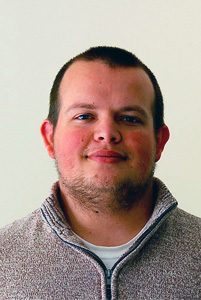Major: Interdisciplinary Studies

Abstract: Who is Looking After the Mental Health of Emergency Medical Service Workers?
Describe your project:
Designing a survey to better evaluate the mental health of emergency medical services personnel and evaluate how they deal with the stress they experience.
Who is your mentor(s) for your project?
Steven McAlpine was my INDS adviser and he was assigned to me when I joined the department. He was integral in making this capstone possible and helped me turn my ideas for research into workable plans.
Dwight Polk was brought in by my INDS adviser as he had helped on prior INDS capstones. He was also eager to look into the psychological side of what emergency medical personnel go through during their job and since he ran the paramedic program at the time he was chosen he had some contacts in the Baltimore City Fire Department. Dr. Eileen O’Brien was also brought in by my INDS adviser as he had worked with her before on INDS capstones. Dr. O’Brien was interested by the topic field of stress on the first responders and brought in an extensive psychological background.
How did you become interested in this project?
I was originally interested in looking at stress on doctors in the ER because I have wanted to be a doctor since I was very young. However, it was pointed out to me by my mentor, Dwight Polk, that doing interviews or surveys with doctors would be difficult for a number of reasons including needing to go through every hospital’s IRB board for the research. He suggested switching the focus to prehospital personnel, EMTs and Paramedics, to make the research easier. Dwight pointed out that EMS also suffered from a lack of research like doctors did and that fire stations and departments were usually easier to work with than hospitals. This made a lot of sense to me and I eventually went through EMT training myself. I have enjoyed my time as an EMT immensely and that has helped drive me to do this research.
How did using an interdisciplinary model benefit your work?
The interdisciplinary model benefited my work greatly as I was able to approach the research from multiple angles. Being able to use psychology alongside emergency health services to understand not only the psychological strain that EMS personnel are put under on a daily but also why parts of that strain may be unavoidable due to the nature of the job was important for the research. Being able to bring in elements of biochemistry to understand how long-term stress physically changes the body and then elements of psychology to understand how a person can ignore the warning signs of chronic stress in themselves was another big aspect. Using any one of the disciplines alone would not have given me as full of a picture of the problem I was trying to tackle.
What has been the hardest part about your research/What was the most unexpected thing about being a researcher?
The hardest part for me was having to change my study from data gathering to a literature review. I had been very excited for the survey and was interested to see what results I would get so I was disappointed when the Baltimore City Fire Department declined to do the survey.
What has been the most rewarding part?
Seeing how much I have grown since I started my capstone project. It was also rewarding to look back and realize how many setbacks I had to overcome to get to the point I did.
How will you disseminate your research?
I believe that the best way would be for me to publish my work in either the UMBC Review: Journal of Undergraduate Research, or in an EMS journal or magazine.
What is your advice to other students about getting involved in research?
My advice would be that setbacks happen and any research is going to run into problems. Plan on things going wrong or having to be changed and you can only be pleasantly surprised when everything goes right.
What are your career goals?
I plan on getting certified as a paramedic and then going on to medical school eventually.
12/10/18